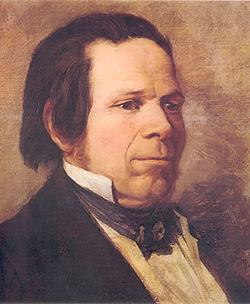
Ignaz Schuppanzigh
Encyclopedia

String quartet
A string quartet is a musical ensemble of four string players – usually two violin players, a violist and a cellist – or a piece written to be performed by such a group...
. Schuppanzigh and his quartet premiered many of Beethoven's string quartets, and in particular, the late string quartet
String Quartets Nos. 12 - 16 and Grosse Fuge, Opus 127, 130 - 135 (Beethoven)
The following set of string quartets is generally referred to as Beethoven's Late String Quartets, including the Grosse Fuge :*Opus 127: String Quartet No. 12 in E flat major...
s. The Razumovsky quartet is considered to be the first professional string quartet. Until the founding of this quartet, quartet music was played primarily by amateurs or by professional musicians who joined together on an ad hoc basis.
Schuppanzigh was born in Vienna, son of a professor of Italian at the Theresian Military Academy
Theresian Military Academy
The Theresian Military Academy is an academy, where the Austrian Armed Forces train their officers. The Academy is located in the castle of Wiener Neustadt in Lower Austria.- History :...
. Before the age of 21, he had established himself as a virtuoso violist and violinist, as well as a conductor. He gave violin lessons to Beethoven, and they remained friends until Beethoven's death.
Schuppanzigh's dedication to quartet playing played a pivotal role in the transition of quartet performance and composition. Prior to Beethoven, the quartet repertoire could be performed competently by good quality amateurs and by professionals with few rehearsals. Beethoven's quartets introduced many new technical difficulties that cannot be completely overcome without dedicated rehearsal. These difficulties include synchronized complex runs played by two or more instruments together, cross-rhythms and hemiola
Hemiola
In modern musical parlance, a hemiola is a metrical pattern in which two bars in simple triple time are articulated as if they were three bars in simple duple time...
s, and difficult harmonies that require special attention to intonation. When Schuppanzigh complained to Beethoven about a particularly difficult passage, Beethoven is said to have remarked, "Do you believe that I think about your miserable fiddle when the muse
Muse
The Muses in Greek mythology, poetry, and literature, are the goddesses who inspire the creation of literature and the arts. They were considered the source of the knowledge, related orally for centuries in the ancient culture, that was contained in poetic lyrics and myths...
strikes me?"
Razumovsky's quartet also premiered works by other composers. Franz Schubert
Franz Schubert
Franz Peter Schubert was an Austrian composer.Although he died at an early age, Schubert was tremendously prolific. He wrote some 600 Lieder, nine symphonies , liturgical music, operas, some incidental music, and a large body of chamber and solo piano music...
dedicated his "Rosamunde" quartet
String Quartet No. 13 (Schubert)
The String Quartet No. 13 in A minor , D. 804, Op. 29, was written by Franz Schubert between February and March 1824...
to Schuppanzigh.
Schuppanzigh was reported to be a handsome youth, but in adult life became seriously obese. Beethoven composed a short, comic choral piece dedicated to him, "Praise to the Fat One" ("Lob auf den Dicken"). Toward the end of his life, Schuppanzigh's fingers reputedly grew so fat that he was unable to play in tune.
Sources
- Schuppanzigh, Ignaz,In Constant von Wurzbach: Biographisches Lexikon des Kaiserthums Oesterreich. 32. Band. Wien 1876. Online-Version:http://www.literature.at/webinterface/library/ALO-BOOK_V01?objid=11780&page=218&zoom=5&ocr=
- Clemens Hellsberg, Ignaz Schuppanzigh. Leben und Wirken, Phil. Diss., Wien 1979.
- The String Quartet: A History by Paul GriffithsPaul Griffiths (writer)Paul Griffiths is a British music critic, novelist and librettist. He is particularly noted for his writings on modern classical music and for having written the libretti for two 20th century operas, Tan Dun's Marco Polo and Elliott Carter's What Next?.-Biography and career:Paul Griffiths was...
(1985: Thames & Hudson). ISBN 0-500-27383-9. - The Beethoven Quartet Companion, edited by Robert Winter and Robert Martin (1994: University of California Press).
- The New Grove Dictionary of Music & Musicians (ed. Stanley SadieStanley SadieStanley Sadie CBE was a leading British musicologist, music critic, and editor. He was editor of the sixth edition of the Grove Dictionary of Music and Musicians , which was published as the first edition of the New Grove Dictionary of Music and Musicians.Sadie was educated at St Paul's School,...
, 1980)

